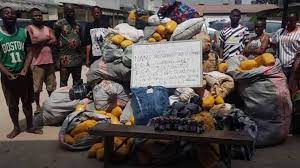The records of withheld illegal drugs, unauthorised sales of intoxicants, and an increase in drug abuse have put Potiskum in a seriously questionable situation. Potiskum, in Yobe state, is an economically viable town, serving as an center of trade, transportation of goods, and other major businesses and local services.
One year ago, I penned an article titled “Is Potiskum Turning Into A Drug Jungle?” published in the Blueprint, Daily Trust, and The Nation newspapers. The objective was to bring attention to the alarming issue of sedative drugs consumption among Potiskum’s youth and urge the National Drug Law Enforcement Agency (NDLEA) and Yobe state government to take prompt action. Unfortunately, the problem has persisted and escalated, with more youths falling into drug abuse than ever before.
However, the recent surge in criminality that has engulfed the once peaceful town of Potiskum has prompted me to bring this issue to the limelight again. The unsettling rise in crime can be attributed, in part, to the incessant consumption of drugs among our youth.
Additionally, approximately five days ago, a tricycle rider fell victim to a merciless stabbing by Keke-napep snatchers, an incident that stands out as particularly peculiar in the town.
Lately, I spoke to a number of drug users and discovered that the suspiciously widespread drug addiction and illegal deals in many parts of Potiskum became exceedingly rampant as people used drugs without proper prescriptions by any medical expert.
Most of the addicts I talked to regretted putting themselves on a drug abuse path in the first place. Others, on the one hand, said that the government didn’t care about them because it didn’t do much or anything to get young people involved in skill-building and empowerment programs.
Some of the victims were upset that they didn’t have a good education, and they felt the government didn’t pay enough attention to their needs. They said that this was the main reason why they engaged in illicit acts of drug abuse.
Musa Mamman (not his real name) is one of the addicts I spoke with. He said, “We were not like this before; we strive to live under the shade of our dreams, but the government has failed to deliver what we necessarily need.”
“Yes, they are considering us as political thugs because we have no other means to reach them unless for what they desire, mostly during elections.”
Mamman said that he and all the men with him, whom I spotted and questioned, fervently wish to stop taking sedatives and find something better for their lives.
While I closely observed their hideouts in the jungles, where they usually hid for drug abuse, some of them said they were there in the first place due to unemployment, which made them helplessly and profoundly depressed.
Similarly, the increase in drug abuse has become a subject that genuinely needs actual consideration and drastic action to combat its rapid growth among youths.
Nonetheless, the most significant point here is to draw the attention of the government and public agencies with the responsibility of fighting against any felonious acts that can profoundly affect society. Both parties should immediately intervene to curb the growth of drug consumption and find a lasting solution.
The government should provide job opportunities for the youths, support them with funds to raise a small business scale, and educate them efficiently. Providing job opportunities can securely remove the most vulnerable youths from illegal acts. It will also keep them from sabotaging government and public properties, thereby decreasing the crime rates in the town or the state at large.
Those drug abuse victims urgently need government or private agencies’ support with funds or facilities to grow a local business or enroll them in schools. The majority of them dropped out of school due to insufficient funding and parental support.
Furthermore, the Federal Agencies in charge of controlling drug abuse and illegal consumption should stand firm in their determination to conduct secret general patrols, seize any hard drugs, and promptly send any guilty person to a correctional facility.
While according to the data released by the United Nations Office on Drugs and Crimes (UNODC) on June 24, 2021, around 275 million people used drugs worldwide in 2020, while over 36 million people suffered from drug use disorders.
The National Drug Law Enforcement Agency (NDLEA) has said that less than 29.4 million Nigerians between the ages of 15 and 64 abuse psychoactive substances and other dangerous drugs. It further stated that 14.3 million Nigerians aged 15–64 use psychoactive substances such as alcohol, caffeine, nicotine, and heroin, while 10.6 million abuse cannabis.
This has indicated that drug abuse is very harmful to society, and the government should not spare those victims without any necessary security intervention. If such illegal drug consumption continues to grow among the population, the children will believe that nothing is wrong with dealing with hard drugs. Moreover, the government may find controlling the kids’ law-breaking mentality challenging.
Kasim Isa Muhammad is an investigative journalist and a reporter with both Neptune Prime and The Citizen Reports newspapers.




